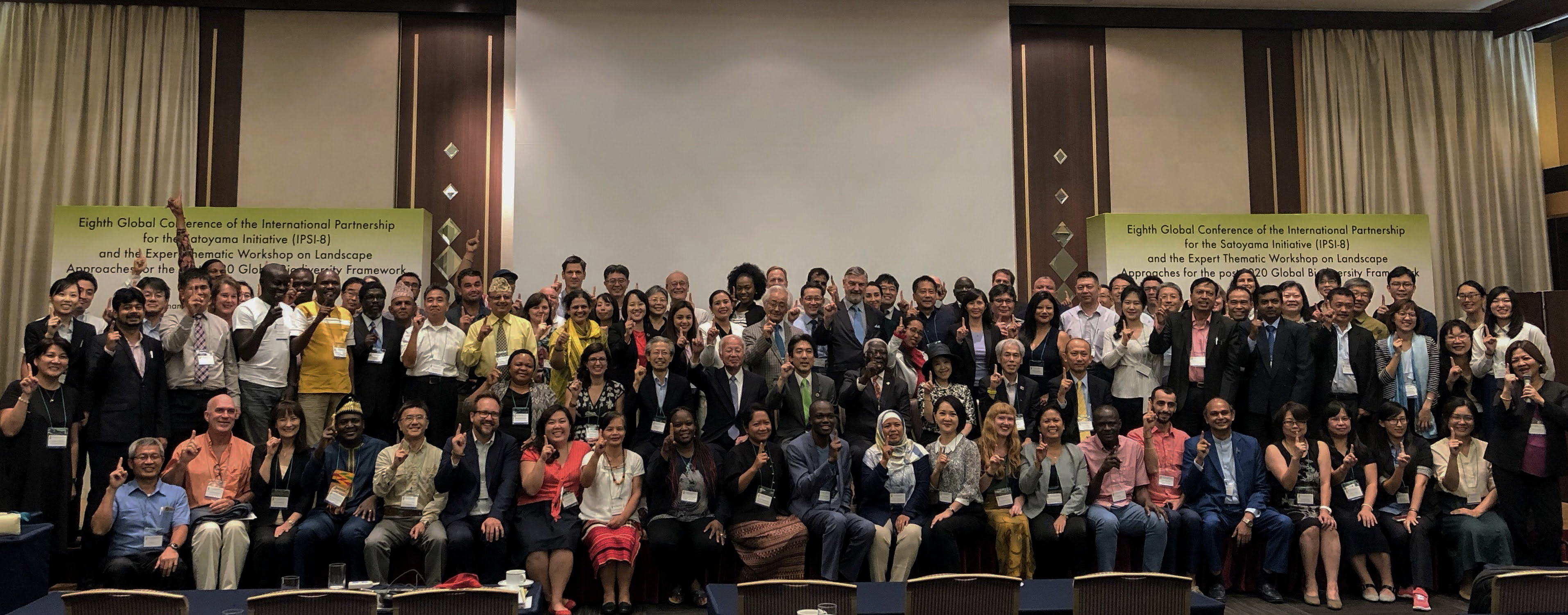Report and abstracts now available
The summary report and collected presentation abstracts for the Satoyama Initiative Regional Workshop in Sabah is now available for download here. The report contains a great deal of information about the workshop and about SEPLS in Asia in general, including lessons learned and policy recommendations.
Overview
The Satoyama Initiative Regional Workshop in Sabah was held from 18 to 20 April in Kota Kinabalu, Sabah, Malaysia. This was the second Satoyama Initiative Regional Workshop to be held in the Asia region and the fifth Regional Workshop overall, following on those held in Asia (Kathmandu, Nepal, 2013), Europe (Florence, Italy, 2014) and Africa (Accra, Ghana, 2015), and Latin America and the Caribbean (Cusco and Pisac, Peru, 2016).
Around 80 participants from more than 15 countries in Asia took part in the whole workshop, including opening and closing plenaries, working-group sessions and a day-long excursion to various sites around Sabah. More than 200 people also joined for part of the workshop, many to see the opening plenary, exhibitions presented in the exhibition hall, excursion sites, etc. The workshop was co-organized by the IPSI Secretariat at the United Nations University Institute for the Advanced Study of Sustainability (UNU-IAS) and the Sabah State Government, with cooperation from the Japan International Cooperation Agency’s Project on Sustainable Development for Biodiversity and Ecosystems Conservation in Sabah, Malaysia (JICA-SDBEC). Workshop costs borne by UNU-IAS were made possible through the financial contribution of the Ministry of the Environment, Japan.
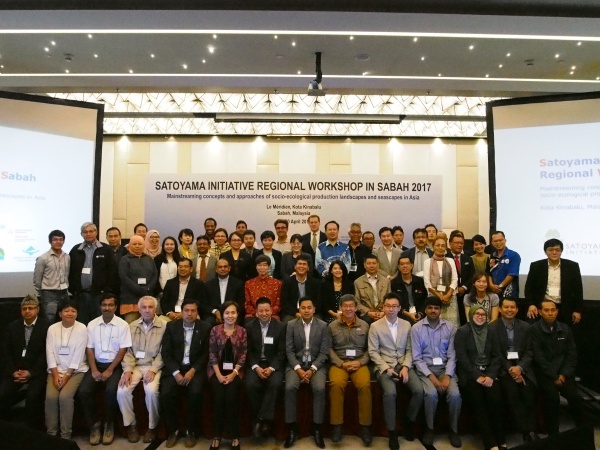
Events
Opening Plenary
The workshop opened with an opening plenary session in the morning of Tuesday, 18 April. The session was opened by emcee Mr. Arthur Chung of the Sabah State Government Natural Resources Office, who introduced first a prayer recital by an official from a local mosque, and then opening remarks from:
- Mr. Naoya Tsukamoto, Director of the IPSI Secretariat
- Dr. Marisa Aramaki, Duty Director, Ministry of the Environment, Japan, speaking on behalf of Mr. Reiji Kamezawa, Director-General of the Nature Conservation Bureau, Ministry of the Environment, Japan
- The Honorable Datuk Teo Chee Kang, Minister of Special Tasks, Chief Minister’s Department, Sabah, speaking on behalf of Datuk Seri Panglima Musa Haji Aman, Chief Minister, Sabah State Government
The first of two keynote speeches came next, given by Prof. Kazuhiko Takeuchi, Director and Project Professor of the Integrated Research System for Sustainability Science, The University of Tokyo and Senior Visiting Professor at UNU-IAS. Prof. Takeuchi spoke on “Socio-ecological production landscapes and seascapes for a society in harmony with nature“.
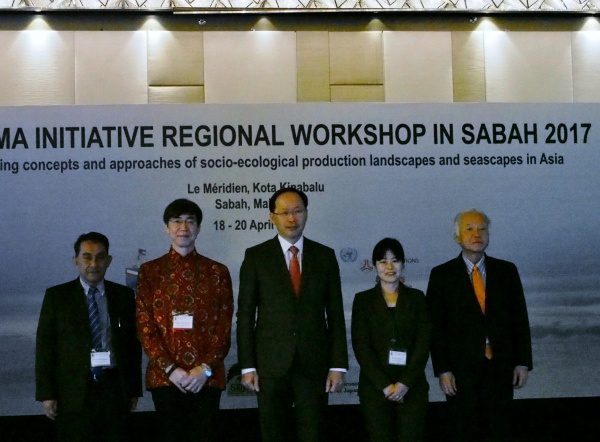
Workshop guests of honor and keynote speakers
After a short break, the second keynote speech was then given by Prof. Fadzilah Majid Cooke, Asian Public Intellectual Fellow and former Professor of Environmental Sociology at Universiti Malaysia Sabah, who spoke on “Community based conserved areas in East Malaysia: a rediscovery of culture in forest landscapes?“.
The keynote speeches were followed by a guest presentation from Prof. Saul Cunningham, Director of the Fenner School of Environment & Society, The Australian National University, who was specially invited as an author of a recent thematic assessment from the Inter-governmental Science-Policy Platform on Biodiversity and Ecosystem Services (IPBES), “The IPBES Assessment of pollinators, pollination, and food production“.
Next came an introduction to the Satoyama Initiative, IPSI, and the Regional Workshop, given by Mr. William Dunbar of the IPSI Secretariat.
The morning session finished with a panel session, moderated by Mr. Tsukamoto and Dr. Jamili Nais, Director of Sabah Parks. The panel session consisted of discussion along with four presentations from the panelists:
- Dr. Kuang-Chung Lee Associate Professor, National Dong-Hwa University “Facilitating the development of a Taiwan Partnership for the Satoyama Initiative, TPSI“
- Mr. Singay Dorji GEF Small Grants Programme, UNDP “Restoring and Managing landscapes in Gamri Watershed, Tashigang“
- Dr. Jamili Nais Director, Sabah Parks, Sabah “Case study from Sabah: Indigenous community conservation area, ICCA“
- Mr. Godfery Kissey Deputy Director 1, Department Of Fisheries, Sabah, Malaysia “The “Tagal System” – A Community-Based Fisheries Management“
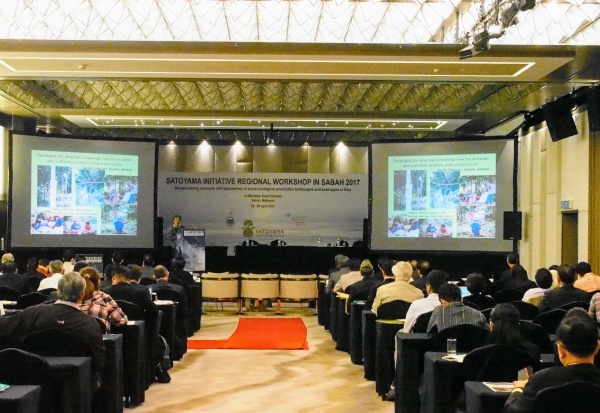
Opening plenary session
Working Groups
The working groups began their breakout sessions after lunch on 18 April. Four working groups were formed based on participants’ thematic focus, with each group beginning with five or six presentations followed by group discussion and conclusions.
Group 1: Ecosystem Restoration
Group 1 was facilitated by Prof. Inocencio Buot of the Open University of the Philippines and Mr. Mashor Mohd Jaini of Sabah Forestry Department. Dr. Shamik Chakraborty from the IPSI Secretariat served as rapporteur.
Presentations:
- Ms. Uma Khumairoh, Integrated Organic Farming Systems Research Centre, Indonesia “Complex Rice Systems; Putting Ecosystem Restoration into Practice“
- Dr. Jeeranuch Sakkhamduang, Institute of Environmental Rehabilitation and Conservation, Thailand “Mainstreaming Concept and Approaches of SEPLS in Eastern Plains Landscape of Cambodia through CAMPAS Project“
- Prof. Mohan Prasad Devkota, Tribhuvan University of Nepal “Mainstreaming People’s Knowledge in Biodiversity Conservation in Sacred Landscapes of Nepal“
- Mr. Ricky Martin, Sabah Forestry Department, Malaysia
- Dr. Marcal Gusmao, Ministry of Commerce, Industry and Environment, Timor-Leste “Selection of drought resistance grain legumes for rice agroecosystems and food security“
- Mr. Yourk Sothearith, Ministry of Environment of Cambodia “Satoyama Initiative in Cambodia“
Group 2: Economic Incentives
Group 2 was facilitated by Mr. Jady Smith of Live & Learn Environmental Education and Mr. Gerald Jetony of the Natural Resource Office of Sabah. Ms. Leimona Beria from the IPSI Secretariat served as rapporteur.
Presentations:
- Dr. Bishnu Hari Pandit, Kathmandu Forestry College “Strengthening village economies through Agroforestry innovation with biochar for increased biodiversity and livelihood options in middle hills of Nepal“
- Mr. Rosman Bin Abd Ghani, TZR Technology “Mainstreaming GREEN ECONOMY in Setiu Wetland, Terengganu, Malaysia“
- Mr. Jayant Sarnaik, Applied Environmental Research Foundation “Engaging with the private sector for ensuring sustainability of socio-ecological landscapes in the Northern Western Ghats of India- opportunities and challenges“
- Mr. William Wong, Department of Agriculture, Sabah
- Mr. Mangal Man Shakya, Wildlife Watch Group “SEPLs in Nepal: approaches to replicate and scale up“
Group 3: Traditional Knowledge
Group 3 was facilitated by Dr. Yoji Natori of Conservation International, Japan, and Mr. Sintiong Gelet of the Sabah Museum. Mr. Yasuo Takahashi of the Institute for Global Environmental Strategies (IGES) served as rapporteur.
Presentations:
- Prof. Rashed Al Mahmud Titumir, Unnayan Onneshan “Complementarities of Human-Nature Well-beings: A Case Illustrated through Traditional Forest Resource Users of Sundarbans in Bangladesh“
- Dr. Prasert Trakansuphakon Indigenous Knowledge and Peoples Foundation, IKAP “Mobilizing Traditional Knowledge, Innovations and Practices in Rotational Farming for Sustainable Development“
- Mr. Dico Luckyhalto Forest Peoples Programme “Dayak Suaid answers to oil palm development threats to landscape and environmental services“
- Mr. Julius Kulip Universiti Malaysia Sabah “Traditional Knowledge on Ecosystems Management by the Dusun People in Tambunan District, Sabah, Malaysia“
- Prof. Dayuan Xue College of Life and Environmental Science, Minzu University of China “Customary Management of Natural Resources by Hani People“
Group 4: Communication, Education and Public Awareness (CEPA)
Group 4 was facilitated by Dr. Kuang-Chung Lee of National Dong-Hwa University and Mr. Ag Shahminan Datuk Hj Ag Sahari of the Natural Resource Office of Sabah. Mr. William Dunbar from the IPSI Secretariat served as rapporteur.
Presentations:
- Ms. Kien Dang, Social Policy Ecology Research Institute “Mainstreaming Native Species Restoration for Ecosystem and Landscape restoration, reporting on the results from the SDM 2016 project at Farmers Field School HEPA“
- Ms. Lily Lin, Hualien District Agricultural Research and Extension Station, Council of Agriculture “Indicator species for agrobiodiversity in rice paddy field: Research and its application to a new eco-labelling scheme in eastern rural Taiwan“
- Mr. Anatolii Victorovich Lebedev, Bureau for Regional Outreach Campaigns “Increasing capacity of local forest and indigenous communities at the Russian Far East target to conduct efficient public control, protection and use of intact temperate forests“
- Dr. Susan Pudin, Environmental Protection Department, Malaysia “Development of community environmental education programmes through co-construction process“
- Mr. Karamat Jameel Organization for Community Development “Rural Education in Pakistan“
Excursion
Participants visited a number of SEPLS-related sites around Sabah on the second day of the workshop for an excursion hosted by the Sabah State Government. After an early-morning start, all participants were brought to Kinabalu Park for a brief explanation from workshop participant Sabah Parks and a group photo. They then proceded to Kampung Luanti, a village implementing the “tagal” system, a traditional management system to ensure resource sustainability by setting no-fishing periods on the local river. There, participants also got to experience the “fish massage”, a local way of using the local fish to attract visitors without catching and eating them. A lunch of traditional local foods was provided in Luanti along with music and dance entertainment by the local youth group.
After lunch, participants were split into two groups. One went to Bundu Tuhan, where they were able to observe the Winokok project for sustainable community-driven forest management and experience planting trees themselves, in addition to a variety of local handicrafts.
The other group visited Kampung Tudan, the site of a JICA-SDBEC project including mulberry-derived products and honey production in the village, as well as a variety of educational and capacity-building initiatives.
Closing Plenary
After a morning of working-group discussions, in which the groups worked toward consensus and conclusions from their initial presentations and discussions, a closing plenary session was held to wrap up the workshop and determine plans for the future.
First, each working group was given a chance to present the outcomes of their discussions to the plenary. Each produced presentation slides, which are made available below:
- Group 1: Ecosystem Restoration
- Group 2: Economic Incentives
- Group 3: Traditional Knowledge
- Group 4: Communication, Education and Public Awareness
After plenary discussion moderated by Ms. Yoko Watanabe from the United Nations Development Programme (UNDP) and Mr. Gerald Jetony of the Sabah State Government’s Natural Resources Office.
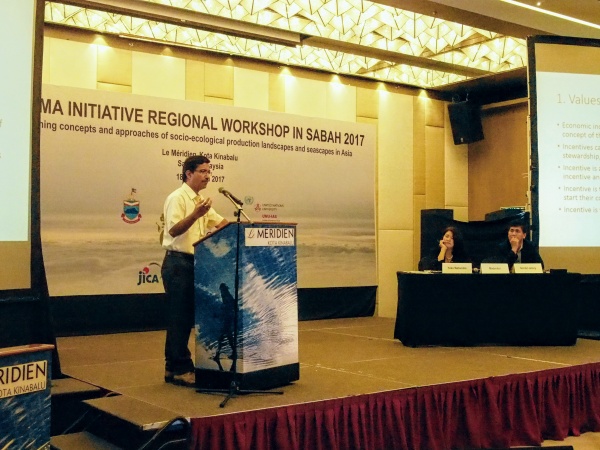
Reporting back from the working groups
An information-sharing session came next, with presentations on a number of IPSI-related projects and developments:
- “GEF-Satoyama Project Update: Experiences to date and the future plan for mainstreaming” by Dr. Yoji Natori, GEF-Satoyama Project Manager at Conservation International Japan
- “Satoyama Development Mechanism (SDM): Community of practitioners for the sustainability and resilience of SEPLS” by Mr. Yasuo Takahashi of The Institute for Global Environmental Strategies and Mr. Yohsuke Amano of the IPSI Secretariat at UNU-IAS
- “Follow Up on 1st Asian Conference on Biocultural Diversity in Ishikawa” by Ms. Mikiko Nagai of the UNU-IAS Operating Unit Ishikawa Kanazawa (OUIK)
- “Update on the COMDEKS Programme” by Ms. Yoko Watanabe of the United Nations Development Programme (UNDP)
Ms. Yoko Watanabe next returned to the stage to give final wrap-up comments and bring together some of the general conclusions of the workshop, noting that continuing follow-up activities would be undertaken by the IPSI Secretariat.
Closing remarks were then given by Mr. Naoya Tsukamoto and Mr. Gerald Jetony, who thanked the participants and wished them a safe journey back to wherever they had come from, whether nearby in Sabah or from around the world.
Exhibition
This year’s Regional Workshop also featured an exhibition hall in the foyer, with exhibitions of local products, development projects and others, providing participants with a chance to learn more about the local area.
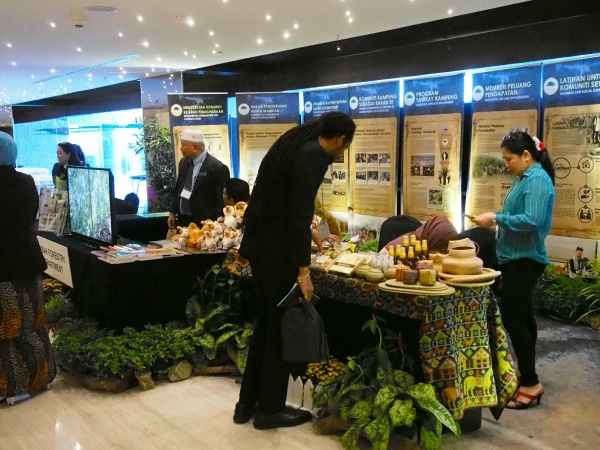
Participants had a chance to see and shop for local goods and handicrafts in the exhibition space
Workshop Documents
The workshop programme is available for download here.



